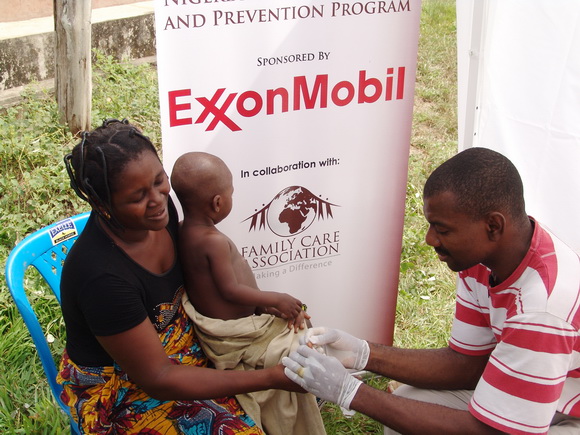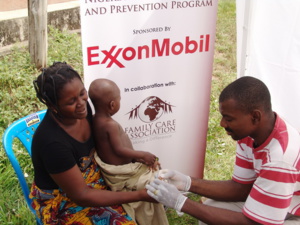In continuation of its 15 years of commitment in the fight with malaria, ExxonMobil has pledged $10 million in new grants for this cause. As a disease although malaria is preventable and treatable, yet worldwide it kills more than half a million people, annually.
This year’s grants from ExxonMobil and the ExxonMobil Foundation support a range of research, education, advocacy and treatment programs to reduce the human and economic toll of malaria. Several grants focus on developing leadership and health workforce capacity in countries and communities that lack adequate health systems to combat malaria and other health challenges.
“For 15 years, ExxonMobil has been a proud partner in the effort to create a future free of malaria. We are committed to investing in the tools, knowledge and human capacity that will allow us to combat and eventually eliminate the disease. Now more than ever, it is clear that strengthening health systems is essential to achieving that goal,” says Suzanne McCarron, General Manager, ExxonMobil and President of the ExxonMobil Foundation.
The effect of the efforts to lessen malaria’s grip is finally making an impact. Since 2000, malaria’s mortality rates have dropped by almost 50%, worldwide, and in Africa by more than 1/3rd. However, anti-malarial drug resistance is emerging as a looming global threat and is negatively effecting the progress that is being made on the malaria front. Thus, it is imperative that innovative approaches and tools be found to counter its effect.
This is where ExxonMobil efforts are most visible. It chips in and is supportive of the fight against this disease by investing in people who fight this disease from every possible angle. Additionally, ExxonMobil has also funded the delivery of a few million mosquito nets for beds, for malarial drugs and diagnostics. Its partners have trained almost 500,000 health workers so as to keep this disease at bay.
Further, ExxonMobil has also funded organizations who engage in research and development activities so as to take head-on the challenge of creating new antimalarial drugs, support and accelerate the development of new anti-malarial treatment.
“Malaria is a complex challenge, and a strong multidisciplinary approach is key to driving progress against the disease. Since 2011, ExxonMobil has supported Oxford scholarships that prepare bright young minds from around the world to tackle pressing global health challenges, including malaria. This commitment to fostering tomorrow’s leaders is invaluable,” says Professor Andrew Hamilton, Vice-Chancellor of Oxford University.
In 2015, ExxonMobil’s grants include the strengthening and capacity increase of malaria fighting capabilities of which the following is just a sample highlight:
Since 2000, ExxonMobil has sunk more than $140 million in grants in the fight against malaria. It is the largest private-sector company fighting malaria worldwide by providing grants to institutions. It has leveraged its business acumen, network and expertise to strengthen and fund initiatives against malaria and in doing so it has reached more than 125 million people.
References:
http://www.businesswire.com/news/home/20150424005688/en#.VTuQE9Kqqko
This year’s grants from ExxonMobil and the ExxonMobil Foundation support a range of research, education, advocacy and treatment programs to reduce the human and economic toll of malaria. Several grants focus on developing leadership and health workforce capacity in countries and communities that lack adequate health systems to combat malaria and other health challenges.
“For 15 years, ExxonMobil has been a proud partner in the effort to create a future free of malaria. We are committed to investing in the tools, knowledge and human capacity that will allow us to combat and eventually eliminate the disease. Now more than ever, it is clear that strengthening health systems is essential to achieving that goal,” says Suzanne McCarron, General Manager, ExxonMobil and President of the ExxonMobil Foundation.
The effect of the efforts to lessen malaria’s grip is finally making an impact. Since 2000, malaria’s mortality rates have dropped by almost 50%, worldwide, and in Africa by more than 1/3rd. However, anti-malarial drug resistance is emerging as a looming global threat and is negatively effecting the progress that is being made on the malaria front. Thus, it is imperative that innovative approaches and tools be found to counter its effect.
This is where ExxonMobil efforts are most visible. It chips in and is supportive of the fight against this disease by investing in people who fight this disease from every possible angle. Additionally, ExxonMobil has also funded the delivery of a few million mosquito nets for beds, for malarial drugs and diagnostics. Its partners have trained almost 500,000 health workers so as to keep this disease at bay.
Further, ExxonMobil has also funded organizations who engage in research and development activities so as to take head-on the challenge of creating new antimalarial drugs, support and accelerate the development of new anti-malarial treatment.
“Malaria is a complex challenge, and a strong multidisciplinary approach is key to driving progress against the disease. Since 2011, ExxonMobil has supported Oxford scholarships that prepare bright young minds from around the world to tackle pressing global health challenges, including malaria. This commitment to fostering tomorrow’s leaders is invaluable,” says Professor Andrew Hamilton, Vice-Chancellor of Oxford University.
In 2015, ExxonMobil’s grants include the strengthening and capacity increase of malaria fighting capabilities of which the following is just a sample highlight:
- Africare - Support communities and train health care volunteers to grasp malaria causality and conduct house-to-house visits for malaria prevention through.
- Grassroots Soccer - Use the popularity of soccer to engage and educate the youth about health issues and malaria through.
- Worldwide Anti-Malarial Resistance Network – So as to further research work on emerging anti-malarial drug resistance and facilitate global collaboration amongst scientists and their peers.
- Oxford University – provide scholarships to bright mind and promising health students who want to pursue a Master of Science in Tropical Medicine and International Health.
- Seed Global Health – the placement of medical volunteers so as to help train the next generation of health professionals.
- Jhpeigo – Through this program it wants to further the capability of community volunteers and health professionals who treat malaria and act as a first line of defense for those affected, especially pregnant women.
Since 2000, ExxonMobil has sunk more than $140 million in grants in the fight against malaria. It is the largest private-sector company fighting malaria worldwide by providing grants to institutions. It has leveraged its business acumen, network and expertise to strengthen and fund initiatives against malaria and in doing so it has reached more than 125 million people.
References:
http://www.businesswire.com/news/home/20150424005688/en#.VTuQE9Kqqko






